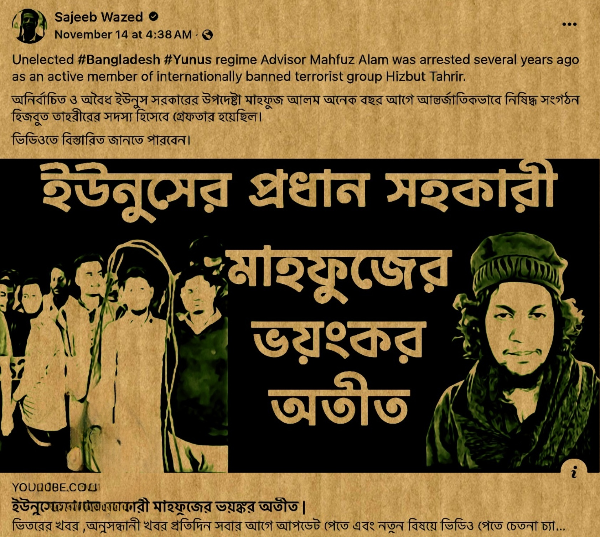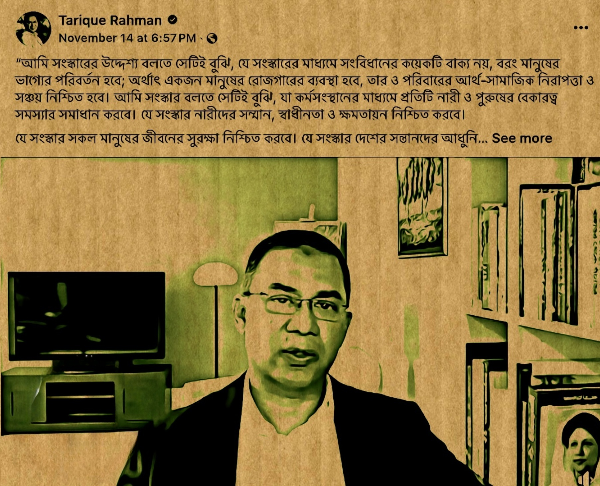Before the disgraceful ousting of former dictator Sheikh Hasina on August 5, following a student-led mass uprising, the people of Bangladesh had long speculated about the future leadership of her Awami League.
After 15 years of suffocating rule and three disputed elections, there was a prevailing belief that the Awami League could continue to govern for another decade or more in such an unruly manner.
In South Asia’s still heavily dynastic political landscape, the natural assumption was that Hasina’s firstborn son, Sajeeb Wazed Joy, would succeed her.
However, even the most loyal Awami League supporters harbored doubts about Joy’s ability to take the reins of such a large political party.
Joy had been living in the United States, married (and later allegedly divorced) a foreigner, and was focused on using Bangladesh only as a testing ground for his unripened ideas on information and communication technology.
Allegations of financial mismanagement and possible money laundering from the ICT sector also raised concerns about his suitability as the next leader of the Awami League.
In contrast, the future leadership of the Bangladesh Nationalist Party (BNP), the Awami League’s arch rival, was much clearer.
Under Hasina’s government, the BNP endured a brutal campaign of repression, which included mass arrests, extrajudicial killings, and the forced disappearance of its leaders and activists.
Tarique Rahman, the eldest son of former Prime Minister Begum Khaleda Zia, was widely seen as the likely successor to lead the BNP, largely due to his ability to maintain control of the party through such difficult times.
His candidacy was not just a matter of inheritance; Tarique had been directing the party’s operations from his exile in London for 15 years, facing countless challenges without ever losing his dedication to the BNP.
Now, two parallel incidents on Thursday ( November 14), involving the sons of former Prime Ministers, provide further insight into why Sajeeb Wazed Joy was never seen as a viable successor to Sheikh Hasina, while Tarique Rahman was always viewed as a leader in the making.

Joy’s ridiculous claims in facebook
Since Hasina’s removal from power, Joy was the first prominent figure from the Awami League to publicly address the party’s complex and contradictory stance on the July uprising.
However, within a few days, he became a laughingstock, offering random, unverified, and often inaccurate information about the repression of minorities in Bangladesh—likely in an attempt to win favor with New Delhi, where his mother had taken refuge.
He also contradicted himself, providing mixed messages about the future of the Awami League.
While attempting to steer the party’s direction, Joy faltered by spreading laughably inaccurate misinformation, quickly becoming the subject of ridicule and memes.
His blunders alienated even the staunchest Awami League supporters, who grew frustrated and disillusioned with his erratic behavior.
In yet another example of spreading false information, on November 14, Joy posted a video on his Facebook page—followed by 3.5 million people—about Mahfuj Alam, an advisor to the interim government led by Nobel Laureate Dr. Muhammad Yunus.
In the video, Joy claimed that Mahfuj had been “arrested several years ago as an active member of the internationally banned terrorist group Hizbut Tahrir.”
The irony, however, was that just three days earlier, Dismislab, an independent, neutral online fact-checking and media research platform based in Dhaka, had published a detailed report debunking the false claims about Mahfuj’s involvement with any banned terrorist organizations or Islamist groups.
These baseless accusations had apparently been used [by Awami League] to portray the rise of jihadism in Bangladesh and the interim government as a supporter of Islamic extremism, aiming to influence perceptions in New Delhi and the West.
However, Mahfuj had not only personally rejected these allegations, but Dismislab’s fact-checking investigation also found no evidence to support them.
Despite this, Joy—likely aware of the falsehood and ridicule surrounding the claim—still chose to post it on Facebook, further damaging whatever credibility or acceptability he had left.

Tarique’s groundbreaking speech
On the same day, Tarique Rahman delivered his much-anticipated speech on the BNP’s 31-point reform agenda through a virtual address, which was broadcast to a large gathering of top party leaders, foreign delegates, and media representatives at a Dhaka hotel.
Tarique’s speech was measured, composed, and direct.
It conveyed a few clear, unambiguous messages: if the BNP comes to power, it will establish a rules-based order and uphold the rule of law, grounded in human rights and freedom of expression.
He stated that the constitution would be amended to ensure no one, not even the Prime Minister, could be above the law.
He also emphasized that the establishment of the rule of law would naturally encourage private capital and investment, as it would serve the best interests of businesses.
Additionally, he assured that development would be pursued without politicizing it, unlike the previous regime under Hasina.
Tarique went on to guarantee that citizens would not face imprisonment for expressing opinions on platforms like Facebook or YouTube. Finally, he reiterated that no one should hold the position of Prime Minister for more than two consecutive terms.
His speech resonated deeply with the people, with social media quickly flooding with praise for his clear vision. He was also commended for his openness to cooperating with the Interim government in its reform efforts.
Despite some controversial actions at the grassroots level—such as BNP leaders allegedly taking control of Awami League-affiliated businesses or engaging in extortion—the party’s top leadership, including Tarique, acted swiftly to address these issues and preserve the party’s image by removing rogue elements from the ranks.
Even The Daily Star, the country’s leading English daily—which had long been a vocal critic of BNP and Tarique Rahman—praised Tarique’s November 14 speech, calling BNP’s commitment to building an inclusive, liberal, and democratic Bangladesh “commendable.
In its editorial, however, the newspaper cautioned that BNP’s “sincerity is the key to achieving such a transformation.” This would require balancing power among the legislative, judicial, and executive branches while dismantling the tools of oppression used by previous governments, said the newspaper.
Nonetheless, these two contrasting events, involving the sons of two former prime ministers and the heads of the two largest political parties, once again highlighted two very different political paths.
Perhaps more than anything else, they underscore why a party like the Awami League, led by someone like Joy, would find it nearly impossible to make a political comeback in the foreseeable future.
After the bloody July uprising, the people of the country would likely be ready to embrace a leader like Tarique Rahman—but not a figure like Joy, whom they see as a mere laughing stock now.
Writer: Faisal Mahmud